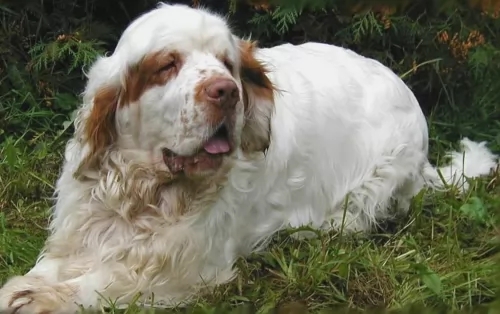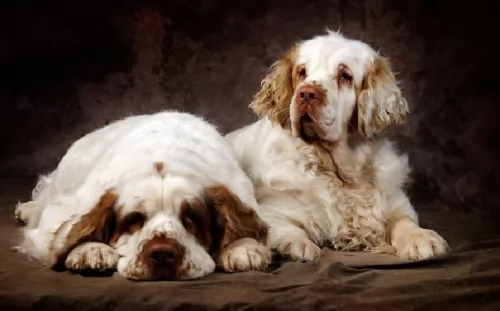 Petzlover
Petzlover Both Clumber Spaniel and Norwich Terrier are originated from United Kingdom. Clumber Spaniel may grow 26 cm / 11 inches higher than Norwich Terrier. Clumber Spaniel may weigh 33 kg / 73 pounds more than Norwich Terrier. Both Clumber Spaniel and Norwich Terrier has almost same life span. Clumber Spaniel may have more litter size than Norwich Terrier. Clumber Spaniel requires High Maintenance. But Norwich Terrier requires Moderate Maintenance
Both Clumber Spaniel and Norwich Terrier are originated from United Kingdom. Clumber Spaniel may grow 26 cm / 11 inches higher than Norwich Terrier. Clumber Spaniel may weigh 33 kg / 73 pounds more than Norwich Terrier. Both Clumber Spaniel and Norwich Terrier has almost same life span. Clumber Spaniel may have more litter size than Norwich Terrier. Clumber Spaniel requires High Maintenance. But Norwich Terrier requires Moderate Maintenance
 Ever since winning in Confirmation at Westminster Kennel Club’s annual show, the popularity of the Clumber Spaniel has increased markedly. The breed of Clumber Spaniel comes from the United Kingdom and it is the largest of all the spaniels. The breed is named for the Clumber Park where it was developed in Nottinghamshire. The Clumber Spaniel a=was designed to be a gundog or hunter in heavy weeds or cover. They have been popular with the Royal Family and were kept by King George V, King Edward VII, and Prince Albert.
Ever since winning in Confirmation at Westminster Kennel Club’s annual show, the popularity of the Clumber Spaniel has increased markedly. The breed of Clumber Spaniel comes from the United Kingdom and it is the largest of all the spaniels. The breed is named for the Clumber Park where it was developed in Nottinghamshire. The Clumber Spaniel a=was designed to be a gundog or hunter in heavy weeds or cover. They have been popular with the Royal Family and were kept by King George V, King Edward VII, and Prince Albert.
It is possible that during the French Revolution, the Duc de Noailles gave his spaniels to the Duke of Newcastle in Nottinghamshire, These spaniels, Alpine Spaniel, are extinct. At the time they were bred with Basset Hounds and Great Pyrenees.
Another line of thought has the Clumber Spaniel descending form an ancient Bleinheim Spaniel, which was used to later develop the King Charles Spaniel.
Whichever theory is true, we know that they were first bred and improved by William Mansell. They were shown in 1859 in England. They were bred almost exclusively by nobility until the mid-19th century. Then World War 1 caused all breeding to be discontinued and the number of Clumbers declined drastically, only to be redeveloped after the was by King George V.
The Cumber won Best in Show at the prestige’s Crufts 1991 Centenary Show. When the American Kennel Club recognized the Clumber Spaniel, there were only 9 other breeds officially recognized. They came to Canada in the same year of 1884. They are also recognized by the UK Kennel Club as a Vulnerable Native Breed. A Clumber bred by Doug Johnson won Best in Show at the 1996 Westminster Dog Show.
The Clumber Spaniel is a loyal, gentle soul who is not very friendly with strangers. They shed all the time and snore loudly.
 Hailing from the United Kingdom and once known as the Cantab Terrier, the Norwich Terrier may be small, but he was bred to hunt rodents.
Hailing from the United Kingdom and once known as the Cantab Terrier, the Norwich Terrier may be small, but he was bred to hunt rodents.
Closely related to the Norfolk Terrier, he is an old dog breed, having existed since the 19th century. Its understandable that such a dog would also be the mascot of Cambridge students.
It is believed that he was bred from Irish Terriers and some believe it came from the Trumpington Terrier, an extinct breed.
 The Clumber Spaniel is heavy-boned, with a very large head and a square muzzle. Of all spaniels, he is the biggest. His expressive face wears a dopey, sad look and his eyes are large, shaped like leaves. The muzzle is as large as the head and his nose is square. He has freckles on his muzzle and a deep chest. His legs are straight, and his feet are solid.
The Clumber Spaniel is heavy-boned, with a very large head and a square muzzle. Of all spaniels, he is the biggest. His expressive face wears a dopey, sad look and his eyes are large, shaped like leaves. The muzzle is as large as the head and his nose is square. He has freckles on his muzzle and a deep chest. His legs are straight, and his feet are solid.
The Clumber Spaniel gives off a dignified air and despite his expressions, he is ready to play or to work at any time.
 As one of the smallest terriers, the Norwich Terrier is also quite a rare dog breed. He is such a cute little dog this, weighing just 5 to 5.5kg and standing at between 23–25cm at the withers.
As one of the smallest terriers, the Norwich Terrier is also quite a rare dog breed. He is such a cute little dog this, weighing just 5 to 5.5kg and standing at between 23–25cm at the withers.
He has erect ears and a double coat that can be wheaten, red, tan, black and tan and grizzle. The tail has always been docked previously, giving the dog an attractive, compact look but these days it is left long. These dogs have small litters – usually between one and three puppies.
The Norwich Terrier is a friendly little dog and is essentially a companion to humans. Just because he is small, doesn’t mean he is frail and helpless. He is a feisty, hardy dog with a brave heart and just loves his human family.
The Norwich Terrier is also strong willed and assertive and it can be of benefit to have him trained and socialized. He is energetic too, so he’ll expect a walk each day, a run in the park and ball games. They also make excellent little watchdogs, at least warning you of approaching strangers.
They are good with kids if the children have been taught to be kind and gentle with animals, and they get on well with other pets in the home too.
 The Norwich Terrier is guaranteed to make you a splendid pet as he is active, friendly, social and intelligent, as well as being loving and loyal.
The Norwich Terrier is guaranteed to make you a splendid pet as he is active, friendly, social and intelligent, as well as being loving and loyal.
You can rely on this little canine friend to want to be with you and take part in all your activities. He won’t do well if you put him in the back yard and forget about him, as he craves human company.
When you do whatever it takes to ensure your Norwich Terrier is an active and treasured member of your family, you’ll be rewarded with a wonderful pet and companion for many years.
 The Clumber Spaniel can suffer from a variety of conditions due to its very design and genetics. Lameness early in life can be attributed to the large and fast-growing bones in the Clumber. This lameness will dissipate when the pup is fully grown. Other issues include:
The Clumber Spaniel can suffer from a variety of conditions due to its very design and genetics. Lameness early in life can be attributed to the large and fast-growing bones in the Clumber. This lameness will dissipate when the pup is fully grown. Other issues include:
Can become dehydrated and all the problems that arise from a dog being overheated and dehydrated.
Must have a caesarian section. They may also have a sensitivity to the anesthesia used in the procedure.
Hypothyroidism with ear and skin complications.
They cannot take sulfa drugs.
 The lifespan of the Norwich Terrier is between 11 and 13 years and he is considered a healthy breed. Every dog owner needs to know that there are some health issues which will require veterinary intervention.
The lifespan of the Norwich Terrier is between 11 and 13 years and he is considered a healthy breed. Every dog owner needs to know that there are some health issues which will require veterinary intervention.
Cataracts, an eye disease may be inherited and it is where the eye gets a cloudy look. Other illnesses to look out for include Patellar Luxation, a problem where the dog's kneecap is dislocated from its normal anatomic position. The condition is fairly common in small dog breeds.
Check problems with the teeth - more specifically incorrect bites because of how the teeth meet.
Sometimes these dogs can battle with breathing problems. Upper Airway Syndrome is when the dogs breathing is raspy.
 The Clumber has a tendency to gain weight and become obese. Feed them wisely. Feed about ¼ to ½ of a cup of high quality dry dog food twice a day.
The Clumber has a tendency to gain weight and become obese. Feed them wisely. Feed about ¼ to ½ of a cup of high quality dry dog food twice a day.
This can be cervical or spinal. The discs can be bulging or ruptured. Can lead to paralysis if not treated properly.
Entropion with inward rolling of eyelid or Ectropion with outward rolling of eyelid.
The Clumber Spaniel is not the most energetic of canines. He still needs moderate exercise daily but don’t overdo it. Walks, fetch, swimming, chase or confirmation are good activities for a Clumber.
 Norwich Terriers are active little dogs and were bred to be working dogs – hunting vermin but also accompanying their owners on horseback. You can see that he has been used to an active lifestyle and will require a daily walk and games. He will also want toys which can keep him occupied in between his active sessions.
Norwich Terriers are active little dogs and were bred to be working dogs – hunting vermin but also accompanying their owners on horseback. You can see that he has been used to an active lifestyle and will require a daily walk and games. He will also want toys which can keep him occupied in between his active sessions.
His size allows him to adapt easily to life in the city or the countryside but wherever he is, he will need a good dose of exercise.
The double coated Norwich Terrier, with his wiry topcoat and soft undercoat will need to be brushed twice a week to avoid matting. This is a dog that will require stripping of the old hairs from the coat. This is a process which ensures the coat retaining its texture and appearance.
If you’re in any kind of doubt, speak to a professional groomer. As it is, many owners of this dog who don’t show their dogs, have them professionally groomed.
Always choose a high-quality dry food. Try and avoid those commercially manufactured foods which contain wheat and gluten and lots of preservatives and colorants. These can affect your pet’s health negatively.
Choose quality foods where protein is at the top of the list of ingredients. Give your pet some homemade food too, keeping his diet as simple and nutritious as possible. Some boiled chicken chopped up together with brown rice or pasta and some cooked vegetables such as carrots, sweet potatoes and spinach will do him the world of good.
A tiny bit of raw meat every once and again will be a good thing. Avoid foods such as chocolates, ice-cream, popcorn, onions and spicy foods as these will upset your pet’s digestive system.
Provide him with a warm, dry, soft bed. If he is outside for any length of time, make sure he has a sheltered area away from the sun and rain.